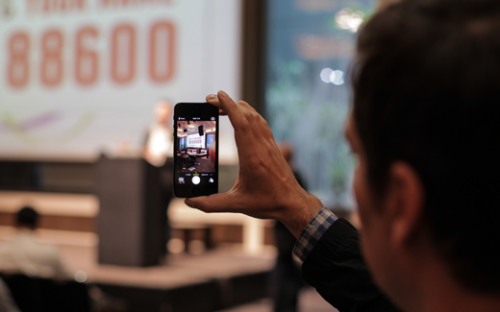As phones have become more advanced, we have begun to use them for everything from social media - which the average person checks 16 times a day - to watching the latest Premier league football game and paying for the weekly shop remotely.
The mobile technology industry is a tasty-looking business concept. While uptake is still slow in the UK as mobile operators and banks work out how to roll out the service, in markets like Slovakia there are reportedly over one million contactless payments per month. MBAs with a passion for cutting-edge markets might want to jump on this mobile express train.
Mobile marketing has transcended national borders, with fast uptake in emerging makets as well as more developed economies. Mobile is arguably not only the best way, but the only way, to reach people in remote areas.
The extra time spent on our phones has the inevitable effect of drawing the attention of marketers who are keen to make sure they maximize their ability to interact with us whenever they can.
It seems that marketers are still trying to get to grips with the best way to grab user attention, without damaging their brand or our user experience.
Unilever, the consumer goods giant, recently ran a campaign in which their consumers received a free voice message from a well-known star, highlighting the benefits of their product. They found this was incredibly productive and experienced a huge increase in sales in these areas.
Unilever has also been using the power of mobile to educate people and increase health awareness in poorer regions with a high incidence of child mortality.
A simple text message explaining the risks of germs and encouraging children to wash their hands resulted in a big reduction in deaths across parts of India.
Speakers at the Mobile Marketing Live event also highlighted the huge increase in the use of tablets in the last three years and especially the last year. By 2016, 50 per cent of the world's population will own a tablet and there will be more tablets than PC computers.
This shift has accentuated the change in the way that we watch TV, with most people unable to watch a program without the added interaction of checking emails, updating Twitter or shopping while they watch.
We are now living in a multi-screen landscape where 69 per cent of the population accesses the internet by two or more devices. The world is simply becoming more connected and we are now at a stage where even fridges have come online. Once simply a storage place to keep our food chilles, refrigerators can now tell us when our milk is out of date (by reading the barcode) and enable us to order our shopping direct from the fridge door.
Finance giants Barclays and MasterCard were also both at the event, keen to showcase the future world of payments through mobile phones. In an exclusive interview with BusinessBecause, Emory MBA and International President of Global Payments - one of the largest transaction company's in the world, highlighted the shift towards using smartphones and tablets for making payments.
Global Payment's Mac Schuessler is an example of an MBA who has reached the highest levels of business leadership thanks to a a depth of knowledge of mobile tech.
Barclays' new product Pingit, which is available to anyone who has a UK mobile number and bank account, is a quick, easy and secure way to make payments for goods and services on the internet using your mobile. It is also taking advantage of QR codes to enable consumers to pay for goods in shop windows, and enable friends to make payments to each other using their mobile phones.
MasterCard's online wallet Masterpass, which can hold everything from your bank card to your loyalty card, is driving us towards one day living in a society without cash.
It is not clear when, or if, that will ever happen. But this industry has huge potential, and it shows no sign of abating anytime soon. If you're interested in fast-growing technology, then look no further than mobile payments. To find out how you can get MBA Jobs with a company in the industry like Global Payments, read this article here.
Are you working in the mobile payments sector? We would love to hear from you. Tweet @BusinessBecause and tell us what the industry can do for MBAs!
RECAPTHA :
0c
55
3c
6c







